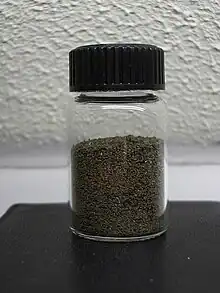Potassium tetraperoxochromate(V)
Potassium peroxochromate, potassium tetraperoxochromate(V), or simply potassium perchromate, is an inorganic chemical having the chemical formula K3[Cr(O2)4]. It is a red-brown paramagnetic solid. It is the potassium salt of tetraperoxochromate(V), one of the few examples of chromium in the +5 oxidation state and one of the rare examples of a complex stabilized only by peroxide ligands.[2] This compound is used as a source of singlet oxygen.[1]
 | |
| Identifiers | |
|---|---|
3D model (JSmol) |
|
| ChemSpider | |
PubChem CID |
|
| |
| |
| Properties | |
| K 3CrO 8 | |
| Molar mass | 297.286 |
| Appearance | red brown |
| Melting point | 70 °C (158 °F; 343 K)[1] (decomposes) |
| Poorly soluble (0 °C) Reacts (45 °C)[1] | |
Except where otherwise noted, data are given for materials in their standard state (at 25 °C [77 °F], 100 kPa).
Infobox references | |
Preparation
Potassium peroxochromate is prepared by treating potassium chromate with hydrogen peroxide at 0 °C:
- 2 CrO2−
4 + 8 H
2O
2 → 2 [Cr(O
2)
4]2−
+ 8 H
2O
The intermediate tetraperoxochromate(VI) is reduced by hydrogen peroxide, forming tetraperoxochromate(V):[3][4]
- 2 [Cr(O
2)
4]2−
+ 2 OH−
+ H
2O
2 → 2 [Cr(O
2)
4]3−
+ 2 H
2O + O
2
Thus, the overall reaction is:
- 2 CrO2−
4 + 9 H
2O
2 + 2 OH−
→ 2 [Cr(O
2)
4]3−
+ 10 H
2O + O
2
The compound decomposes spontaneously at higher temperatures.
References
- John W. Peters; Paul J. Bekowies; Arthur M. Winer; James N. Pitts Jr. (1975). "Potassium perchromate as a source of singlet oxygen". Journal of the American Chemical Society. ACS Publications. 97 (12): 3299–3306. doi:10.1021/ja00845a003.
- Sergienko, V. S. (2007). "Structural chemistry of peroxo compounds of group VI transition metals: I. Peroxo complexes of chromium". Crystallography Reports. 52 (4): 639–646. Bibcode:2007CryRp..52..639S. doi:10.1134/S1063774507040116. S2CID 95018505.
- Haxhillazi, Gentiana. "Preparation, Structure and Vibrational Spectroscopy of Tetraperoxo Complexes of CrV+, VV+, NbV+ and TaV+". Archived from the original on 2011-07-18. Retrieved 2009-03-07.
- Riesenfeld, E. H.; Wohlers, H.E.; Kutsch, W.A. (1905). "Höhere Oxydationsproducte des Chroms". Berichte der Deutschen Chemischen Gesellschaft. 38 (2): 1885–1898. doi:10.1002/cber.190503802113.
This article is issued from Wikipedia. The text is licensed under Creative Commons - Attribution - Sharealike. Additional terms may apply for the media files.